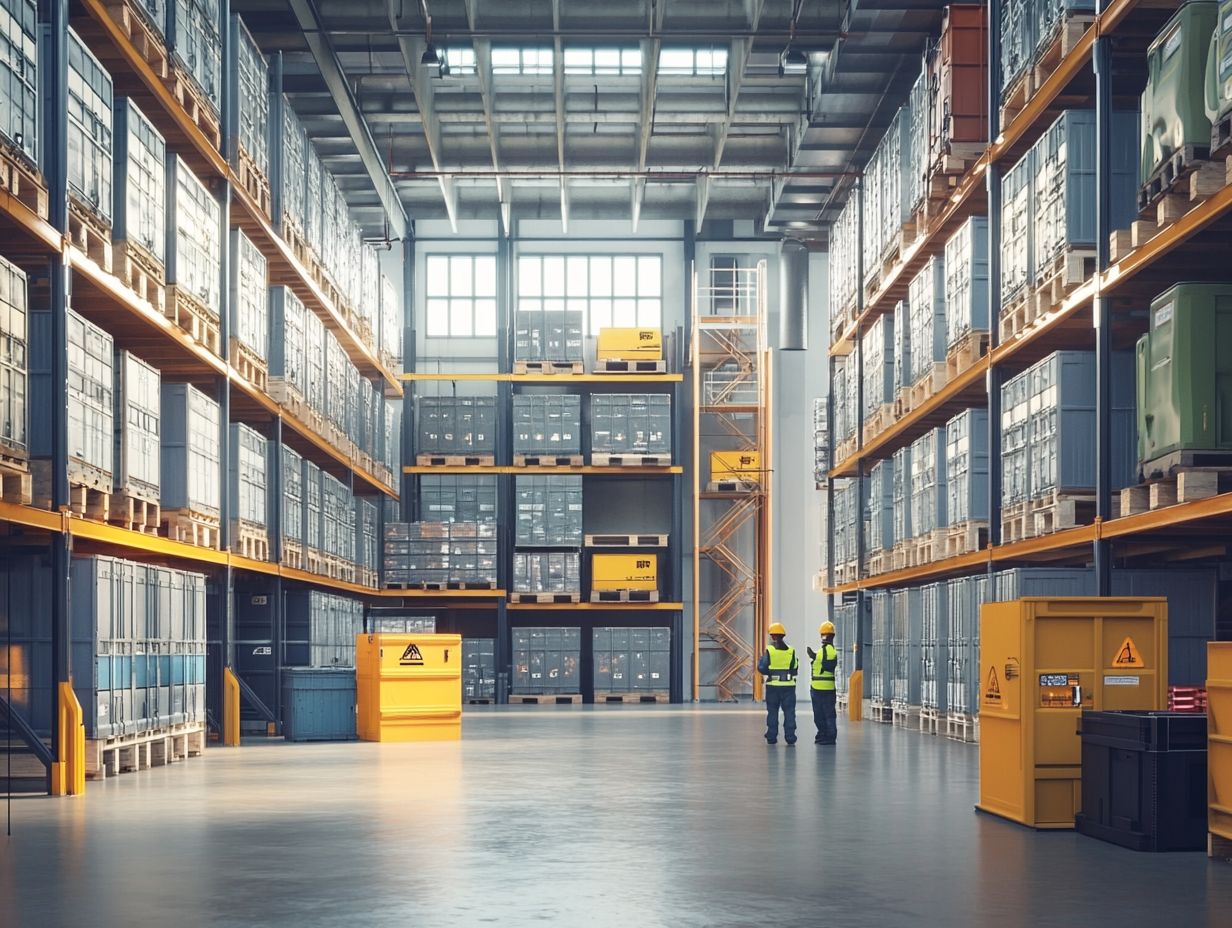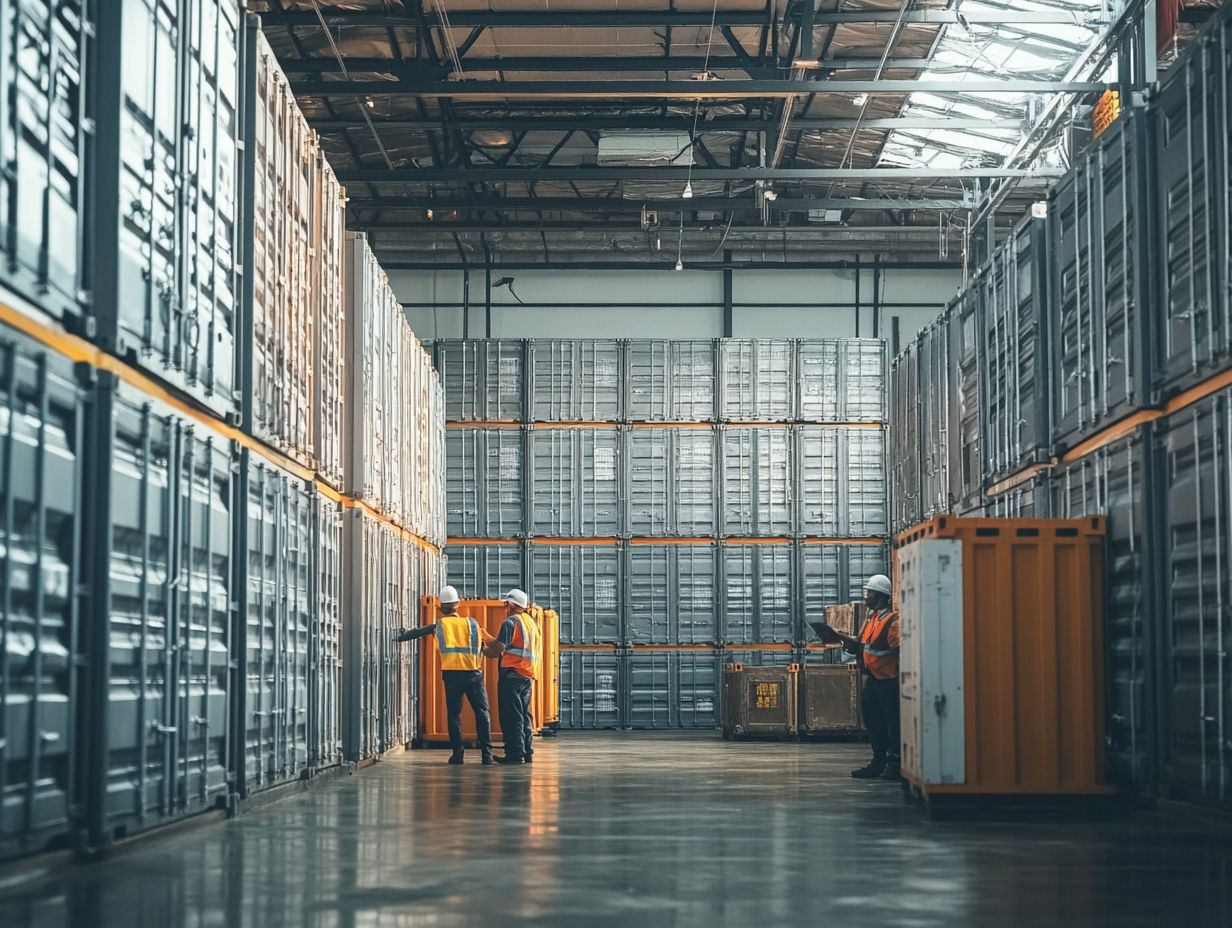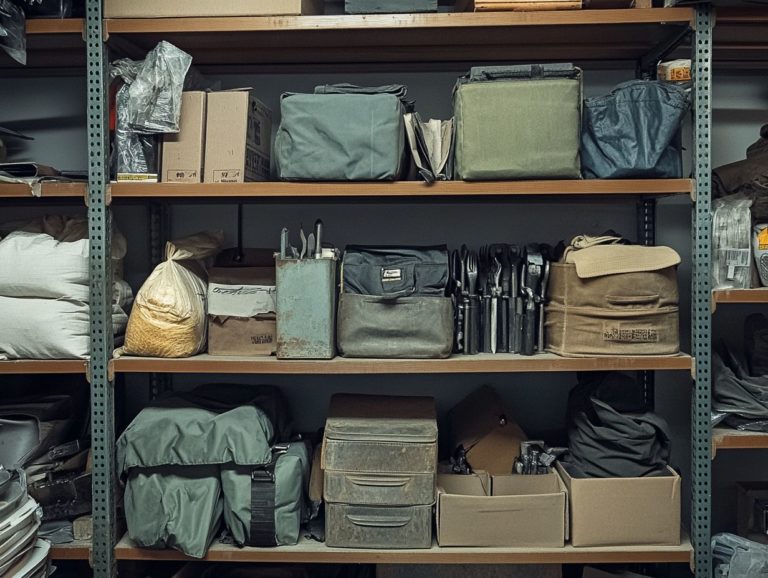The Impact of Local Laws on Metal Storage
Metal storage laws are essential for ensuring the safe handling and management of various metals, each carrying significant industrial and environmental implications.
This article will guide you through the purpose and scope of these local regulations. It will highlight the types of metals commonly regulated, their applications, and the necessary requirements for safe storage. You ll also learn about the penalties for non-compliance and the broader impact these laws have on businesses and individuals.
Knowing these rules is important! They can make a big difference for you and your community.
Contents
- Key Takeaways:
- Overview of Metal Storage Laws
- Types of Metals Regulated
- Requirements for Metal Storage
- Penalties for Non-Compliance
- Impact on Businesses and Individuals
- Frequently Asked Questions
- What is the impact of local laws on metal storage?
- Do local laws differ from state to state?
- Are there any restrictions on the types of metal that can be stored?
- Do local laws require permits for metal storage?
- What happens if I violate local laws on metal storage?
- Is it important to stay updated on local laws regarding metal storage?
- Conclusion
Key Takeaways:

- Metal storage laws exist to regulate the storage and handling of certain metals to protect public safety and the environment!
- Commonly regulated metals include hazardous materials like lead and mercury, as well as valuable metals like gold and silver.
- Non-compliance can lead to hefty fines! Don t let that happen to you.
Overview of Metal Storage Laws
Metal storage laws encompass a range of regulations designed to ensure the proper management and disposal of hazardous materials.
These include materials defined under the Resource Conservation and Recovery Act (RCRA), which outlines stringent requirements to follow the law.
These laws are crucial for federal facilities and stakeholders involved in metal storage. They aim to reduce health hazards and environmental impacts linked to hazardous waste.
Grasping these regulations is vital for maintaining adherence to environmental standards and protecting public health.
Understanding the Purpose and Scope of Local Laws
Local laws governing metal storage play an essential role in ensuring compliance with both state and federal regulations regarding hazardous waste management and environmental protection.
These regulations serve as essential frameworks that local authorities rely on to navigate the complexities of waste generation.
The responsibility for enforcing these laws often rests with local agencies, who monitor compliance and take civil actions against those who fail to adhere.
This oversight includes regular inspections, allowing you and your fellow citizens to become vigilant stewards of the environment.
Citizen enforcement mechanisms allow you to report violations, promoting accountability and encouraging businesses to practice safe metal storage.
This collaborative approach enhances the dialogue around environmental stewardship and fosters sustainable practices within the community.
Types of Metals Regulated
You should be aware that various metals are regulated under environmental laws because of their hazardous properties.
This includes heavy metals such as lead, mercury, and cadmium, as well as military munitions. These materials necessitate stringent waste management practices to ensure safety and compliance.
Commonly Regulated Metals and Their Uses

Commonly regulated metals like lead, mercury, and cadmium can be found in batteries, electronics, and construction materials.
Take lead, for instance. It frequently hides in older paint and plumbing systems. Exposure can pose significant risks to brain development in children.
Then there s mercury, commonly found in fluorescent lamps and certain medical devices. It can accumulate in aquatic ecosystems and harm fish, ultimately impacting human health when consumed.
Cadmium is often found in nickel-cadmium batteries and can contaminate soil and groundwater, affecting crops and making its way into the food chain.
Recycling initiatives play a crucial role in reducing risks. They safely reclaim these metals and protect our environment.
By doing so, you help reduce environmental contamination and promote sustainable resource management. Through proper recycling processes, you can prevent hazardous materials from ending up in landfills, lessening their potential impact on health and the ecosystem.
Requirements for Metal Storage
Metal storage requirements are dictated by a blend of federal guidelines and local regulations designed to ensure the safe handling and storage of hazardous materials.
You must adhere to specific conditions, including utilizing safety data sheets and conducting regular monitoring analyses to maintain compliance and safeguard your operations.
Storage Conditions and Safety Measures
Storage conditions for hazardous metals require your strict adherence to safety measures designed to protect both human health and the environment. This includes implementing groundwater protection protocols and ensuring proper labeling.
Maintaining effective temperature control is essential to prevent any reactions that could lead to hazardous situations. Employ state-of-the-art containment systems, such as secondary containment structures, to manage potential spills or leaks. These measures are critical for safeguarding the surrounding areas.
Establishing comprehensive emergency procedures is imperative to ensure a rapid response in the event of unforeseen incidents. Training your staff on these measures is crucial. By equipping them with the knowledge needed to handle materials appropriately, you reinforce the importance of best practices in hazardous waste management.
Penalties for Non-Compliance
The penalties for failing to comply with metal storage regulations can be severe. You could face civil penalties enforced by the EPA or even legal actions initiated by concerned citizens or state authorities.
This highlights the importance of adhering to environmental laws to protect not only your interests but also the environment itself.
Fines and Legal Consequences

Fines for violations of metal storage regulations can escalate dramatically, depending on the severity of the offense. This often places considerable economic burdens on businesses and leads to legal repercussions for individuals.
For example, a well-known manufacturing company recently faced a staggering penalty exceeding $1 million due to inadequate metal storage solutions that resulted in environmental contamination. This hefty financial blow not only affected their profits but also attracted significant negative media attention, tarnishing their public image.
The legal implications can extend far beyond mere fines, potentially incurring litigation costs and necessitating a comprehensive restructuring for compliance. It s crucial for organizations like yours to prioritize adherence to these regulations; non-compliance can trigger a cascade of consequences, including forced operational shutdowns and a profound loss of client trust.
By diligently maintaining compliance, you safeguard both your financial stability and the reputation of your organization.
Join the fight against hazardous waste today!
Impact on Businesses and Individuals
The influence of metal storage laws on businesses and individuals encompasses economic, environmental, and health aspects. Non-compliance can result in substantial fines and contribute to serious environmental degradation.
Staying informed and adhering to these regulations is crucial for protecting your financial interests, the well-being of the environment, and public health.
Economic and Environmental Effects
The economic effects of metal storage laws can significantly impact your business expenses. These laws also encourage initiatives toward waste minimization and environmental protection.
As you navigate compliance strategies, you might find yourself balancing the need to achieve financial goals with the responsibility of managing dangerous materials properly. This balancing act requires savvy financial planning and a commitment to sustainable practices that lessen environmental impact.
Weaving together economic considerations with strong environmental stewardship can pave the way for innovative solutions. Such solutions can enhance both profitability and public health.
Frequently Asked Questions
What is the impact of local laws on metal storage?

The impact of local laws on metal storage varies based on specific regulations. These laws often dictate the types of materials that can be stored, the location and size of storage facilities, and the safety measures that must be implemented.
Do local laws differ from state to state?
Yes, local laws on metal storage can differ from state to state. Some states may enforce stricter regulations, while others may have more relaxed rules.
Are there any restrictions on the types of metal that can be stored?
In some cases, local laws may restrict the types of metal that can be stored due to environmental concerns or safety hazards. Researching and understanding these restrictions is essential for ensuring compliance.
Do local laws require permits for metal storage?
Depending on the location and amount of metal stored, a permit may be necessary. This ensures that the storage facility meets safety and environmental standards.
What happens if I violate local laws on metal storage?
Violating local laws on metal storage can lead to fines and penalties. In some cases, the storage facility may be shut down until the necessary changes are made to comply with regulations.
Is it important to stay updated on local laws regarding metal storage?
Stay ahead of the game! Keep yourself informed about local laws regarding metal storage, as regulations may change over time. It is the responsibility of the storage facility owner to ensure compliance with all applicable laws.
Conclusion
Understanding metal storage laws is vital for protecting your business and the environment. Check your local metal storage regulations today to ensure compliance and safeguard public health.















